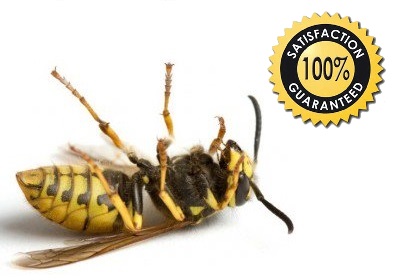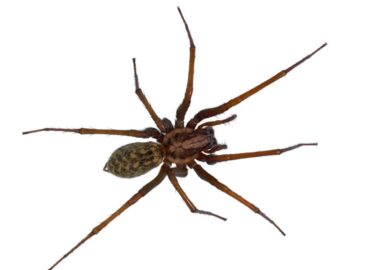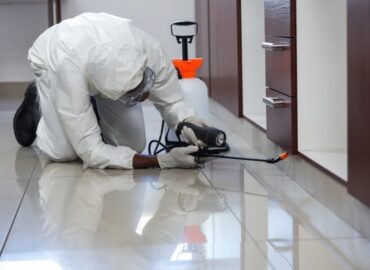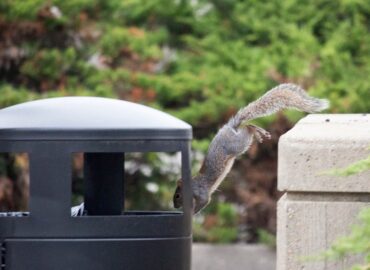Recognizing wasp infestation is a little tricky because they have an uncanny resemblance with bees starting from their physical features and the nest where they live. Just like bees, there are types of wasps like Fig Wasp that helps in pollinating flowers.
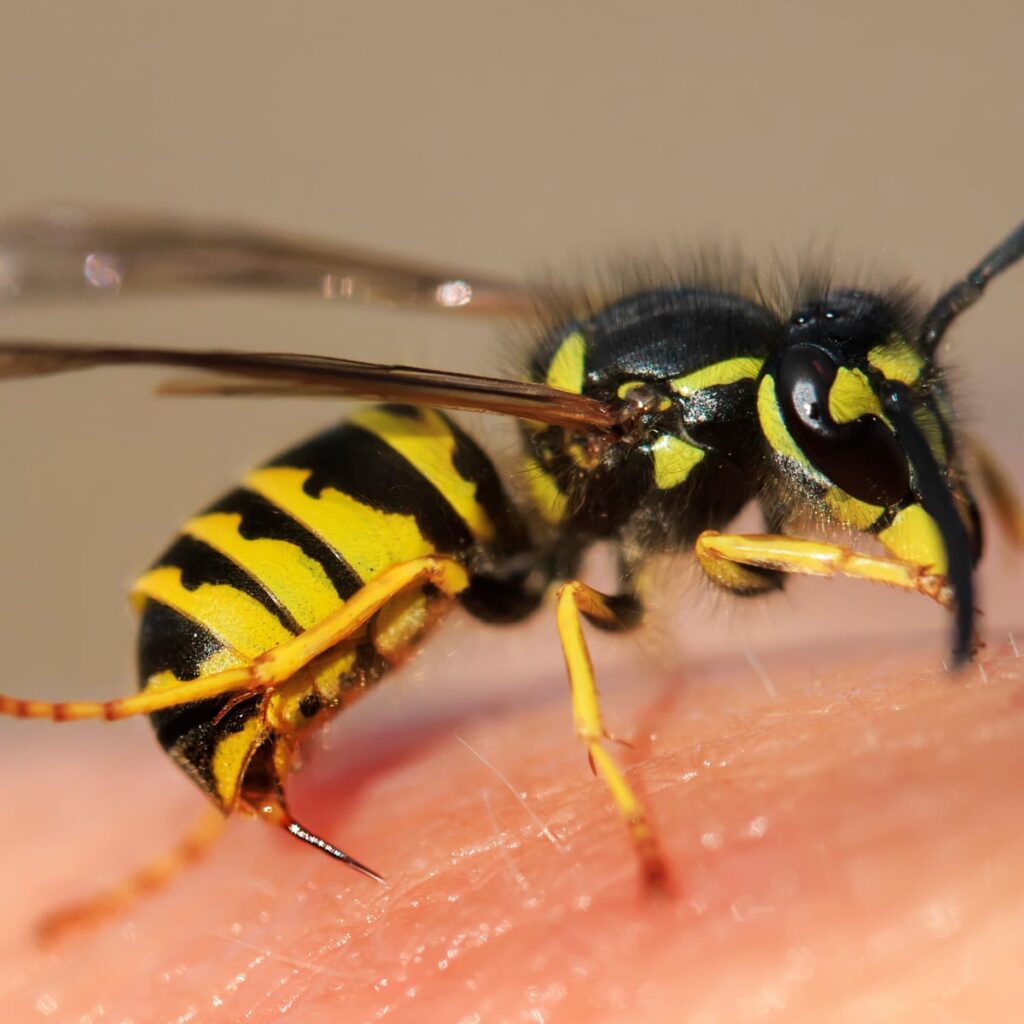
But be wary, there’s a type of wasp that can actually kill you– more commonly known as Hornets. They carry around venom on their pointy stinger which can be used multiple times to attack.
This is why you must have a knack for recognizing what’s flying around your house. Getting stung by a wasp, especially a hornet, is the least of what you’ll wish for.
What is the sign of wasp infestation?
A nest is a dead giveaway that there’s an evident infestation in your area. It could be easily mistaken as a bee’s nest, so it’s better to call a professional to check the situation closely.
But if you have time to observe without disturbing them, you can try looking at their physical features. Wasps have a shinier and skinnier body compared to bees.
Hot weather can make wasps extremely aggressive, so there’s a good chance that you might notice an increasing number of them during summer.
They are always prepared to attack just in case they get provoked or disturbed in their habitat. That’s the reason why you’ll often see them swarming in one place around their nest.
Wasp Elimination
There’s no other proper way of eliminating wasps other than calling the professionals. But if you want to try out your luck, it’s better to find where their colonies are currently located.
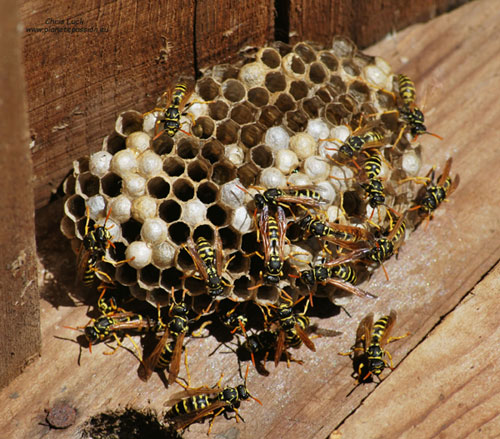
Determining what type of wasp you’ll have to deal with can give you a clue whether it’s worth your time to do it on your own. Wasps nest located on the ground can be easily eliminated by pouring paint on their habitat.
Winter’s freezing temperature will kill every wasp around your area except for the queen wasps. Better strike while the iron is hot before the springtime starts.
Queen wasps are just bound to build their colony again, so early termination can prevent them from laying their eggs for good.
Wasp Prevention
Journal of Pest Management Science reveals that some essential oils are effective in repelling wasps. They suggest combining a mixture of clove, geranium, lemongrass and rosemary essential oils as it totally prevents the wasps from going around the area.
A simple combination of soap and water can also kill the wasps. It is proven to be effective in blocking the spiracles where wasps breathe.
Just be cautious when you’re trying to get near to their nest. Wear protective gear before anything else.
Blocking all the entry points will also prevent them from entering your home. Make sure that your windows and trash bins are well-sealed, especially if you’re aware that there’s a wasp nest near your area.
If there are trees nearby, check them from time to time to see if there’s any visible colony hanging around.
Common types of Wasp in Vancouver
Just like humans, wasps are also diverse species. They are well-favoured by farmers because they prey on insects that destroy crops.
Some of them can also contribute to pollinating flowers. But as helpful as they might be, their presence can be very intimidating and scary for the usual neighbourhood.
Some people are also deadly allergic to wasps that’s why we’re keen on eliminating them.
There are three types of wasps that can be commonly found in Vancouver.
Yellow Jackets
- Yellow jackets look like bees at first glance, but when you inspect them closely, you’ll notice the difference. Yellow jackets have bodies that look like armour.
- They are particularly attracted to sweet foods that’s why you can often spot them during picnics where outdoor food is rampant.
Hornets
- Hornets can look pretty similar to yellow jackets, but they are relatively larger and thicker. They also come in different colours such as yellow, black and in rare cases, white.
- Hornets can usually be found in aerial nests made of paper. They are not as territorial as Yellow Jackets, but once you provoke them, they will quickly attack you. Their sting is excruciating compared to the other species.
Paper Wasps
- Paper wasps have been thriving in Canada for so many years now. They have heads that are too small for their long body. They size up to 8cm, which is a considerably tall measurement for wasps.
- Unlike Hornets, Paper wasps can only create small colonies. They can approximately accommodate up to thirty wasps per nest.
- They are not very aggressive unless you find a way of provoking their resting area.
Where do wasps build nests
Wasps pretty much build their nest wherever they wish to. But the most common places are on tree branches, eaves of the attic, window sills or even chimneys.
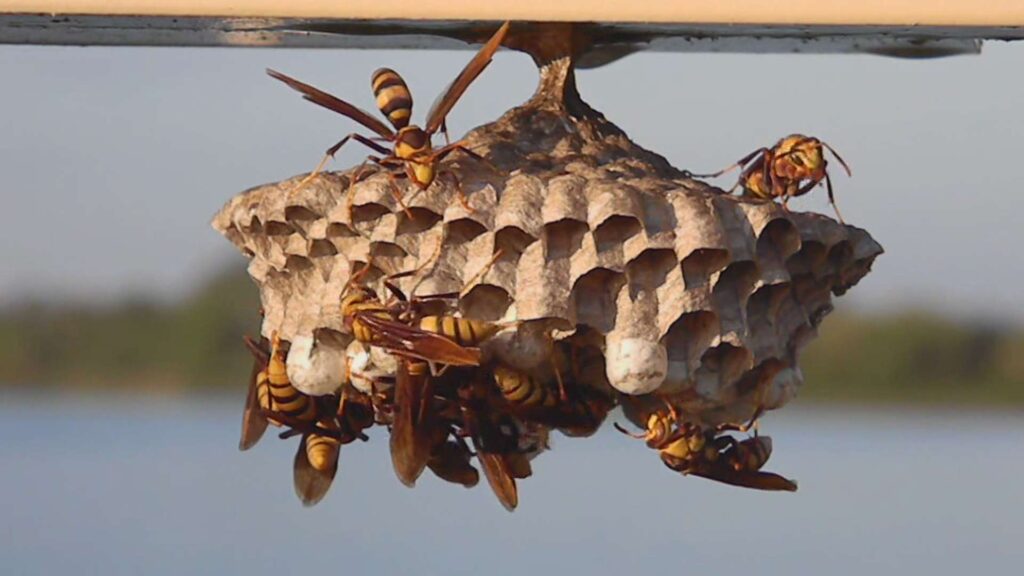
Some can also build a nest on the ground. Their goal is to be not accessible to any intruders while managing to be near their source of “construction material” which is wood.
You might be wondering. If their nest is made up of wood, how did it turn into paper material? Simple wasps chew on wood fibre until it breaks down into paper pulp.
The queen does its job by mixing her saliva to the paper pulp, which will serve as a hardening agent to their nest.
If you think wasps are particularly attracted to your home, reevaluate how your house is built. Weathered wood and barely touched areas like abandoned garages or attic can really attract wasps because it’s a suitable living environment for them.
How to remove the wasp nest
Before you attempt to remove the wasp nest, you need to take serious safety preventive measures first.
If you’re unsure if someone’s allergic in your household to wasp’s sting, pushing through removing the nest might not be the best idea. Call a local exterminator to do the job for you.
Also, consider if the wasps around your area are genuinely intrusive.
Wasps play a significant role in the food chain, and while they do sting, most of the time, they never swarm around someone who didn’t attack them first.
If you can manage to get near them, wear something that will protect you from their sting.
Spray their nest with soapy water from the distance and never use a ladder to reach them unless you’re confident that they can no longer move.
Put the nest in the trash bag and expose it under the sun to completely kill the wasps.
Wasp life cycle and, habit, and behaviour
Wasps don’t have a long life span. When the winter approaches, they usually die in starvation and extreme cold.
The fertilized queen wasps can hibernate, but many also get killed due to insects preying on them.
When a queen survives the winter, she will start building a new nest where a new colony emerges. They rapidly increase during the summer, where fertilized female and unfertilized male wasps are born.
How dangerous are wasps
Wasps are dangerous because they can sting multiple times without destroying their abdomen. People can handle numerous stings, but to someone who’s allergic to wasps, it can be highly deadly.
One sting can trigger an anaphylactic reaction that stops a person from breathing.
They are highly aggressive, so if you ended up distressing one of them, there’s a good chance that they will release a pheromone to alert the other colony members.
Wasps attack in groups, and if you’re unlucky, they will follow you around.
How is wasp different from bees?
Compared to wasps, bees are pretty chubby and hairy. Wasps possess shiny skin, and they are comparably slimmer due to their narrow waist.
Bees are also not as aggressive as wasps. Skilled beekeepers can easily scoop them up without getting attacked.
On the other hand, wasps are quite irritable, so even if you’re not precisely disturbing them, if they feel threatened, they’ll come for you.
The most apparent difference between wasps and bees is their stingers. While it may come out as a shock, only female wasps and bees can possess stingers.
But their difference comes in their ability to sting multiple times. Bees can only sting you once, and they will most likely wind up dead.
Wasp control in Vancouver service by top-line pest control
TOPLINE PEST CONTROL offers top-notch wasp extermination for the people residing in Vancouver.
From residential to commercial and industrial areas, TOPLINE can manage to control the wasps lurking around. They use various methods to exterminate wasps.

Their services are not only limited to Wasp control. If you have any other pests that have been bugging your place for a long time, they can also handle the inspection and provide the best solution to exterminate them.
Why should you call the topline for wasp control in Vancouver?
TOPLINE PEST CONTROL exterminators have professional state licenses and certification, so you’ll know that you’re in good hands. They also offer thorough inspection to evaluate the best method to eliminate the wasps around your area. With many proven positive reviews, TOPLINE will surely get the job done for you without risking yourself from getting stung.
What are the techniques used to remove and prevent wasp infestation in Vancouver?
Various techniques can be done to get rid of wasp infestation. If you want to opt for something readily accessible, you can use the natural method (freezing temperature, essential oils and soapy water).
But with professionals, have access to equipment and pesticides that will surely get rid of wasps for good. They also provide a long-term plan to keep the wasps from coming back.
Wasp Control Service by Topline pest control:
- Wasp control in Vancouver
- Wasp control in Surrey
- Wasp control in Langley
- Wasp control in Coquitlam
- Wasp control in Port Coquitlam
- Wasp control in Burnaby

